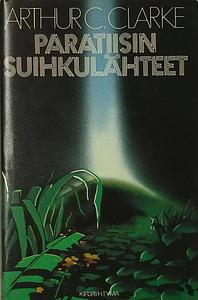Take a photo of a barcode or cover
I wanted to learn more about the space elevator concept a couple of years ago, so I put this book on my list as likely to be a prime example of its use in fiction. I was not disappointed, as Clarke’s depiction has carefully taken into account the technical details needed to give it the realism it deserves. It’s clear why this is a classic, and an award winning novel.
On the other hand, it’s nevertheless a product of its time, and it comes across as somewhat dry in its narrative style. The cast of characters is small, considering the grandness of the concepts and the epic scale of the events. So there aren’t many people for the reader to get to know; of those, Morgan is the only one with any real substance, and even he is a bit inscrutable.
But he does manage to carry the plot forward through the critical moments, and the conclusion is fairly satisfying, if bittersweet. Clarke was clearly a master of his craft, and this is a decent example of it, even if it wasn’t as compelling a story as I’ve come to expect from my reading material.
On the other hand, it’s nevertheless a product of its time, and it comes across as somewhat dry in its narrative style. The cast of characters is small, considering the grandness of the concepts and the epic scale of the events. So there aren’t many people for the reader to get to know; of those, Morgan is the only one with any real substance, and even he is a bit inscrutable.
But he does manage to carry the plot forward through the critical moments, and the conclusion is fairly satisfying, if bittersweet. Clarke was clearly a master of his craft, and this is a decent example of it, even if it wasn’t as compelling a story as I’ve come to expect from my reading material.
I avoid reading books by Arthur C .Clarke one after the other. I save one for every year or so knowing that there are only so many books that I can truly enjoy with guarantee. The description of the book may make it sound like it's just about the engineering aspects of a space elevator. It is actually far from it. In the book the author merges history (although slightly modified) and the future seamlessly. It doesn't seem like a science fiction book or a historical fiction but an amalgamation of these both, a genre yet unnamed. I thoroughly enjoyed the descriptions of Sri Lankan geography as much as the fine engineering details of the space elevator.
I find writing reviews quite tiresome but through my suggestion I hope more people read this book and appreciate it.
I find writing reviews quite tiresome but through my suggestion I hope more people read this book and appreciate it.
Clark has a way of taking a concept like building a space elevator that doesn't include much sci-fi action and adventure and turn it into an interesting novel full of history, philosophy, and technology. Most of the book is about the history of Sri Kanda and the years of building the space elevator and the problems associated with it. At the end we get some conflict and tension with the testing of the elevator. This is a good book from one of the best.
Classic Clarke tale, filled with inspirational technical achievements and wonderful descriptive prose.
adventurous
hopeful
mysterious
reflective
tense
medium-paced
Plot or Character Driven:
Plot
Strong character development:
Complicated
Loveable characters:
No
Diverse cast of characters:
No
Flaws of characters a main focus:
Yes
adventurous
informative
tense
medium-paced
Plot or Character Driven:
Plot
Strong character development:
Yes
Loveable characters:
Yes
Diverse cast of characters:
No
Flaws of characters a main focus:
No
I don't know if this is actually quite three stars for me, but it is three stars compared to his other book I read, Rendezvous With Rama. While Rendezvous had no plot, cardboard characters, and answered pretty much none of the questions, Fountains did better. There was actually a plot and an effort to develop the characters. But in the end, it seems like Clarke is really more of an idea guy who then tries to construct a book around that idea so people will read about it. Not really my style for the most part.
“Because politics is the science of the possible, it only appeals to second-rate minds. The first raters only interested in the impossible.”


